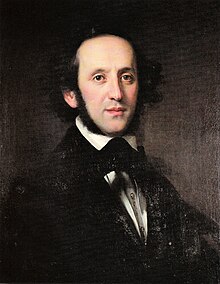Felix Mendelssohn
German composer, pianist, organist and conductor of Jewish descent (1809–1847)
Jakob Ludwig Felix Mendelssohn-Bartholdy (February 3, 1809 – November 4, 1847), a child-prodigy, thence a famous German composer. In his final years, Mendelssohn founded the University of Music and Theatre Leipzig.


| This musician-related article is a stub. You can help out with Wikiquote by expanding it! |
Quotes
edit- A prophet such as we could use again today, strong, zealous, angry and gloomy in opposition to the leaders, the masses, indeed the whole world. (Letter to his pastor Julius Schubring, 1846, regarding Mendelssohn's choral work 'Elijah' published that year)
- Ich überhaupt vielseitigkeit nicht recht mag, oder eigentlich nicht recht daran glaube. Was eigenthümlich, und schön, und groß sein soll, das muß einseitig sein.
- I dislike many-sidedness, which, moreover, I rather think I do not much believe in. Anything that aspires to be distinguished, or beautiful, or really great, must be one-sided.
- Letter to his parents, June 6, 1831, cited from Reisebriefe von Felix Mendelssohn Bartholdy: Aus den Jahren 1830 bis 1832 (Leipzig: Hermann Mendelssohn, 1862) p. 157; translation from Lady Wallace (trans.) Letters from Italy and Switzerland (Philadelphia: Frederick Leypoldt, 1863)
- Und sind Sie mit mir einer Meinung, daß es die erste Bedingung zu einem Künstler sei, daß er Respekt vor dem Großen habe, und sich davor beuge, und es anerkenne, und nicht die großen Flammen auszupusten versuche, damit das kleine Talglicht ein wenig heller leuchte?
- And do you agree with me, that the first condition of an artist should be to bear respect towards what is great, and to bow to it and acknowledge it, and not attempt to extinguish great flames for the sake of making his own rushlight burn more brightly?
- Letter to Wilhelm Taubert, August 27, 1831, cited from Reisebriefe von Felix Mendelssohn Bartholdy: Aus den Jahren 1830 bis 1832 (Leipzig: Hermann Mendelssohn, 1862) p. 256; translation from Emil Naumann (trans. F. Praeger) The History of Music (London: Cassell, 1886) vol. 2, p. 1052-53.
- Die Leute beklagen sich gewöhnlich, die Musik sei so vieldeutig; es sei so zweifelhaft, was sie sich dabei zu denken hätten, und die Worte verstände doch ein Jeder. Mir geht es aber gerade umgekehrt. Und nicht blos mit ganzen Reden, auch mit einzelnen Worten, auch die scheinen mir so vieldeutig, so unbestimmt, so mißverständlich im Vergleich zu einer rechten Musik, die einem die Seele erfüllt mit tausend besseren Dingen als Worten. Das, was mir eine Musik ausspricht, die ich liebe, sind mir nicht zu unbestimmte Gedanken, um sie in Worte zu fassen, sondern zu bestimmte.
- People often complain that music is too ambiguous, that what they should think when they hear it is so unclear, whereas everyone understands words. With me, it is exactly the opposite, and not only with regard to an entire speech but also with individual words. These, too, seem to me so ambiguous, so vague, so easily misunderstood in comparison to genuine music, which fills the soul with a thousand things better than words. The thoughts which are expressed to me by music that I love are not too indefinite to be put into words, but on the contrary, too definite.
- Letter to Marc-André Souchay, October 15, 1842, cited from Briefe aus den Jahren 1830 bis 1847 (Leipzig: Hermann Mendelssohn, 1878) p. 221; translation from Felix Mendelssohn (ed. Gisella Selden-Goth) Letters (New York: Pantheon, 1945) pp. 313-14.
See also
edit- Charles Rosen#The Romantic Generation (1995), Ch. 10 : Mendelssohn and the Invention of Religious Kitsch